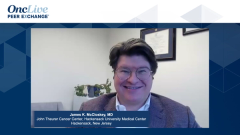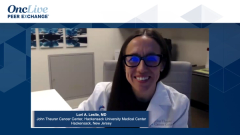
Primary Analysis of the SYMPATICO trial in Mantle Cell Lymphoma
Focusing on mantle cell lymphoma, Lori A. Leslie, MD, reviews the primary analysis of the SYMPATICO trial investigating ibrutinib-venetoclax combination therapy.
Episodes in this series

This is a synopsis of a Peer Exchange series featuring James K. McCloskey, MD, and Lori A. Leslie, MD, of John Theurer Cancer Center, Hackensack University Medical Center.
Dr. Lori Leslie, Associate Professor of Medicine and Director of Indolent Lymphoma and CLL Research Programs at the John Theurer Cancer Center, discusses results from the phase 3 SYMPATICO trial in relapsed/refractory mantle cell lymphoma presented in a late-breaking abstract at the 2022 ASH Annual Meeting. While Bruton tyrosine kinase (BTK) inhibitors like ibrutinib are standard-of-care in the relapsed/refractory setting, venetoclax combinations have shown growing evidence of synergistic efficacy and safety across B-cell malignancies, prompting this comparison.
SYMPATICO randomized 267 patients to ibrutinib plus either venetoclax or placebo for 2 years. With a median follow-up of 51 months, the primary endpoint of progression-free survival was significantly longer at 31.9 months with ibrutinib/venetoclax versus only 22 months with ibrutinib/placebo. The complete response rate also nearly doubled from 32% to 54% with venetoclax added. While the trend toward improved overall survival did not meet statistical significance, the median rose from 38.6 to 44.9 months.
Toxicity was manageable, with higher but expected rates of cytopenias seen with ibrutinib/venetoclax, but similar incidences of infection versus ibrutinib alone. Thus, Dr. Leslie suggests the venetoclax combination represents a valuable chemo-free option for relapsed/refractory mantle cell lymphoma patients, prolonging remission duration and response quality over ibrutinib monotherapy. Ongoing studies are also assessing synergistic combinations upfront, including with chemoimmunotherapy backbones. As such, determining optimal positioning of venetoclax alongside emerging CAR T-cell therapy options will be important amidst the rapidly shifting treatment paradigm for this aggressive lymphoma subtype.
*Video synopsis is AI-generated and reviewed by OncLive editorial staff.






































